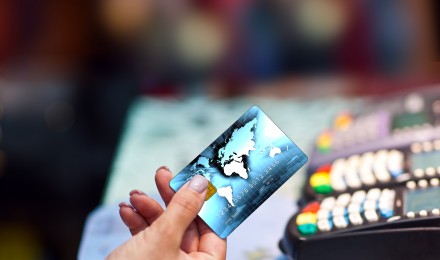There are many different ways that you can become a victim of credit card fraud. Unfortunately, the methods used to gather someone’s credit card information is changing frequently, which means that you need to be aware of as many of them as possible. Here are five steps you can take to minimize the likelihood of credit card fraud.
Keep Your Credit Card Information Secret
One way that thieves get credit card information is simply by going through someone’s trash, says the Federal Trade Commission. Two things that they might look for are billing statements for your credit card, which would have your card number on it, and also for credit card applications that you throw away but did not destroy.
By not destroying a credit card application, a thief could fill it out, get the card sent to a new address, and have the bill sent to you. This could give them a lot of buying power – and leave you with a big bill. It could also hurt your credit score until you get it straightened out.
Watch Who You Give Your Credit Card Information to
You want to be very careful who you give your credit card information to, in order to help avoid credit card fraud. When in person, you should try and keep an eye on the credit card and not let it out of your sight. It only takes a minute or two to photograph your card, or jot down the numbers. When on the phone, do not give out your credit card number unless you have initiated the call, says ScamBusters.org.
Do Not Enter a Credit Card Number into an Unsecure Webpage
It is easy to make credit card purchases online and you can buy almost anything. Reputable companies use secure webpages, and you can identify them by the symbol of a lock on the lower right of the page frame, says the FBI, and by the “https” at the start of the URL.
Before doing business with a company you are not familiar with, the FBI also suggests that you do a brief check on it first. You can do this by looking for information or complaints about the company online, and by going to the Better Business Bureau.
Do Not Respond to Emails with Credit Card Information
One of the most popular ways to steal someone’s credit card information is to send an email and just ask for it. Credit card scams typically pretend to be some well-known company or bank and say they need to confirm your data. ABCNews says they even may use a company’s official logo or similar website – but don’t fall for it. The truth is the real organization already has your information, and they would not ask you for a social security number in full or an account number through an email.
Minimize the Number of Credit Cards You Carry with You
The Federal Trade Commission also suggests that you can further avoid credit card fraud by only carrying with you the credit cards that you might need to use during a specific outing. Leave the rest at home. They also suggest that you do not carry them in your wallet or purse – in case you should lose it or have it stolen.
You can often avoid credit card fraud by being careful. If a problem does occur, be sure to contact your credit card company quickly and talk with them about correcting the problem. In most cases, you will find them to be very helpful and unlawful charges may be dropped.
There are many different ways that you can become a victim of credit card fraud. Unfortunately, the methods used to gather someone’s credit card information is changing frequently, which means that you need to be aware of as many of them as possible. Here are five steps you can take to minimize the likelihood of credit card fraud.
Keep Your Credit Card Information Secret
One way that thieves get credit card information is simply by going through someone’s trash, says the Federal Trade Commission. Two things that they might look for are billing statements for your credit card, which would have your card number on it, and also for credit card applications that you throw away but did not destroy.
By not destroying a credit card application, a thief could fill it out, get the card sent to a new address, and have the bill sent to you. This could give them a lot of buying power – and leave you with a big bill. It could also hurt your credit score until you get it straightened out.
Watch Who You Give Your Credit Card Information to
You want to be very careful who you give your credit card information to, in order to help avoid credit card fraud. When in person, you should try and keep an eye on the credit card and not let it out of your sight. It only takes a minute or two to photograph your card, or jot down the numbers. When on the phone, do not give out your credit card number unless you have initiated the call, says ScamBusters.org.
Do Not Enter a Credit Card Number into an Unsecure Webpage
It is easy to make credit card purchases online and you can buy almost anything. Reputable companies use secure webpages, and you can identify them by the symbol of a lock on the lower right of the page frame, says the FBI, and by the “https” at the start of the URL.
Before doing business with a company you are not familiar with, the FBI also suggests that you do a brief check on it first. You can do this by looking for information or complaints about the company online, and by going to the Better Business Bureau.
Do Not Respond to Emails with Credit Card Information
One of the most popular ways to steal someone’s credit card information is to send an email and just ask for it. Credit card scams typically pretend to be some well-known company or bank and say they need to confirm your data. ABCNews says they even may use a company’s official logo or similar website – but don’t fall for it. The truth is the real organization already has your information, and they would not ask you for a social security number in full or an account number through an email.
Minimize the Number of Credit Cards You Carry with You
The Federal Trade Commission also suggests that you can further avoid credit card fraud by only carrying with you the credit cards that you might need to use during a specific outing. Leave the rest at home. They also suggest that you do not carry them in your wallet or purse – in case you should lose it or have it stolen.
You can often avoid credit card fraud by being careful. If a problem does occur, be sure to contact your credit card company quickly and talk with them about correcting the problem. In most cases, you will find them to be very helpful and unlawful charges may be dropped.






